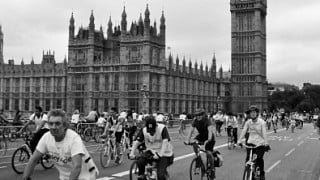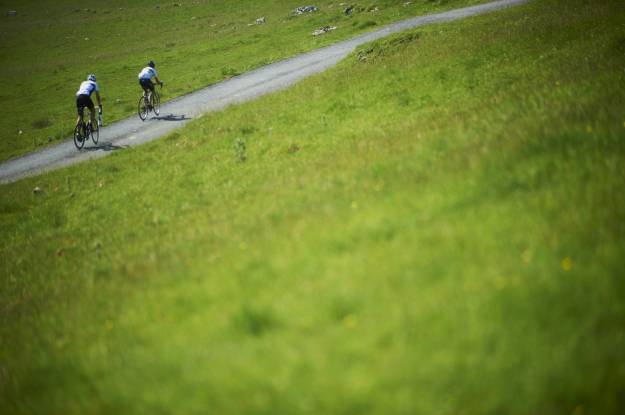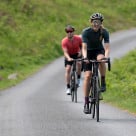Cycling Safety: Parliamentary Debate
Thursday 23 February 2:30pm
Westminster Hall
Report: Eddie Allen
Related:
Today Westminster Hall saw a landmark three-hour debate on cycling safety led by Lib Dem MP Julian Huppert, triggered by The Time’s ‘Cities Fit for Cycling’ campaign combined with pressure from the All Party Parliamentary Cycling Group (APPCG) and British Cycling, as part of the UK Cycling Alliance.
Over 70 MPs from across all parties attended the debate which began with APPCG co-chair Julian Huppert praising his colleagues for engaging with the debate and praising The Times for bringing it about.
Huppert then gave way to APPCG chair and British Cycling member Ian Austin who set the tone of the session, delivering a speech that spelled out The Times', British Cycling’s and his own emotional commitment to campaigning for cycling safety, speaking of the tragic death of British Cycling employee and prominent cyclist Rob Jefferies and the accident which has left Times journalist Mary Bowers in a coma, triggering the newspaper’s #cyclesafe campaign. “This issue will not go away” was Austin’s repeated message.
Austin went on to outline the key points of The Time’s manifesto including HGV safety, junction design, road user training and urban speed limits and concluded by requesting widespread backing amongst MPs and voters: “I want all the cyclists following this debate to email and write to their MP. Go to their surgeries, persuade them to back this campaign,” Austin said. “I want every MP here today to join the All Party Group, table questions, raise these issues in the chamber and back our campaigns to boost cycling and improve safety for cyclists.”
Austin concluded by addressing the debate Chairman Mike Weir: “Because Mr Weir, that is the biggest tribute we could pay to Rob Jefferies, to Eilidh Jake Cairns, to Cath Ward and of course to Mary Bowers and all of those injured or killed whilst cycling”
To read the full transcript of Ian Austin’s speech click here.
Following Austin’s speech the debate moved on to address some of the key points of The Time’s manifesto. The reduction in urban speed limits to 20mph was raised by Nia Griffith, MP for Llanelli and Ben Bradshaw, MP for Exeter, who stated his support for lower urban speed limits before stressing that cycling safety wasn’t just an urban, but a rural issue too.
Bradshaw’s point was echoed by a number of MPs, with Nia Griffith calling for a “high profile campaign to stress the dangers of speed on rural roads” and citing the French example of giving cyclists more room (1.5 metres) when overtaking. Jonathan Lord, Conservative MP for Woking agreed, stating that “some of the most dangerous roads for our cyclists are our rural roads,” before going on to say that cyclists should be given the respect given to riders on horseback on rural roads.
|
Over 70 MPs attended the debate. Here’s the full list of attendees Ian Austin, Maria Eagle, Tessa Jowell, Kerry McCarthy, Andrew Smith, Lilian Greenwood, Susan Jones, Kate Hoey, Alison Seabeck, John Leech, Mark Lazarowicz, Ben Bradshaw, Zac Goldsmith, Sir Gerald Kaufman, Nia Griffith, Sadiq Khan, Jeremy Corbyn, Heidi Alexander, Stella Creasy, Tony Cunningham, Jim Cunningham, Karen Buck, Martin Horwood, Andrew Slaughter, Meg Hillier, Jason McCartney, Andrew George, Tom Brake, Fabien Hamilton, Guy Opperman, Julian Sturdy, Rehman Chishti, John Howell, Richard Harrington, Rob Wilson, Jack Lopresti, Mark Hunter, Sir Alan Beith, Simon Kirby, Andrew Bingham, Michael Ellis, Mike Weatherley, Sarah Woolaston, Jane Ellison, Gavin Barwell, Mark Menzies, Graham Evans, Paul Maynard, Nigel Mills, Fiona Bruce, Angie Bray, Tessa Munt, Jonathan Lord, Bob Stewart, Neil Carmichael, Andrew Selovs, Stephen Lloyd, Oliver Colville, Shailesh Vara, Sir George Young, Richard Graham, Norman Baker, Andrew Jones, Julian Huppert, Steve Brine, Robin Walker, Sir Bob Russell, Diane Abbott, Jo Swinson, Seema Malhotra, Rushinara Ali, Stephen Pound and Sheila Gimor. |
||
Many MPs attending the debate stressed the role of Local Authorities in delivering improvements in cycling safety. Mark Lazarowicz, MP for Edinburgh North, emphasised the need for local authority buy in. Graham Evans, Conservative MP for Weaver Vale agreed, stating that much could be done by local authorities to improve the current condition of our roads. Stephen Pound, Labour MP for Ealing North illustrated the point with an example from his constituency, where the local authority was able to effect adaptations to refuse collection vehicles to make them safer for cyclists.
However, Ben Bradshaw MP of Exeter made the contrasting point that change relied on top-down leadership, urging that the Government “must speak with one voice on’ cycling safety and be ‘led from the top’. This echoes the views of British Cycling, whose Road Safety Manifesto calls for strong high level political leadership to bring about change.
Mutual respect, the overarching message of British Cycling’s road safety campaign, was also emphasised by a number of MPs. Bob Stewart – Conservative MP for Beckenham had twice been hit from behind cycling in London but called for cyclists to behave within the law to foster a culture of respect. Kate Hoey, MP for Vauxhall, raised the issue of conflict between cyclists and pedestrians. Julian Huppert responded that all road users should behave legally but put the scale of cyclist/pedestrian incidents into perspective. Sarah Wollaston, Conservative MP for Totnes and a committed cyclist herself summed up the need for a shift of perception in the way we think about cyclists; - “Let’s abandon the language of denial and neglect”, said Wollaston, pointing to the fact that ‘accident’ is a misnomer, applied to an event which has a cause and is therefore preventable, as Maria Eagle reaffirmed later in the debate.
Of the many ways in which serious injury and death is preventable, the issue of HGV safety was foremost, understandable given the context of the debate and the injuries sustained by Times journalist Mary Bowers in November 2011. Zac Goldsmith, MP for Richmond Park urged for a rethink on transport policy which currently encourages more freight on the roads. Andrew Smith – Labour MP for Oxford East said that the HGV road charging scheme should be channelled into funding adaptations to HGVs such as blind spot sensors as well as and driver training, adding “Let’s make sure that this is not just a venting of worthy debate”. Meg Hillier, MP for Hackney South and Shoreditch pointed to the example in her borough which provides free cycle awareness training to HGV drivers.
Junction design and infrastructure was also a key debate topic. Jane Ellison, Conservative MP for Battersea voiced her support for ‘early start’ traffic lights as one of a range of measures to increase cyclist safety and ended by expressing her hopes that the debate “is the beginning of a big conversation”.
Amid critical debates on safety issues a number of MPs expressed the need to temper messaging around ‘danger’ with the promotion of cycling as a healthy, enjoyable activity. Sarah Wollaston, Conservative MP for Totnes began her speech by saying “30 years ago I fell in love on a tandem” before stressing the ‘joy of cycling’. However, Steve Brine, Conservative MP for Winchester struck the balance – “We don’t want to just make our cities safer, want to make them a pleasure to cycle in.”
Following the debate, Shadow Transport Secretary Maria Eagle began the summing-up by remembering the tragedy that triggered the debate and crediting Mary Bowers’ employer The Times for bringing cycling safety to the attention of government. Eagle demanded “a renewed commitment to cycling safety,” stating that it is “about will as much as it is about money.”
Ms Eagle went on to call for the reintroduction of the Cycling Towns and Cities project – voicing her regrets that the government had chosen to scrap Cycling England and associated funding and replace it with the Local Sustainable Transport Fund, before proposing the creation of a best practice toolkit based on the experiences from the 18 Cycling Towns and Cities.
The Shadow Transport Secretary strongly endorsed British Cycling's recent letter to Secretary of State for Transport Justine Greening, requesting that the Government consider cycling safety as a matter of course in all road and transport projects.
Ms Eagle concluded by saying that our roads were not designed with the cyclist in mind and that major funding is required to improve road design. The Shadow Transport Secretary also raised the need to move faster in improving existing junctions before stating that Labour would spend £100M per year on improvements to cycling infrastructure, including segregation and traffic light phasing.
Norman Baker's response
The debate ended with the response from Transport Minister Norman Baker who outlined current spending on cycling before responding implicitly to the eight points of The Times manifesto.
- On HGV safety measures – Baker said that government needed to be careful that measures are effective and that government is leading discussions at European level
- Identifying the UK’s 500 most dangerous junctions – Baker stated that he had given authority for all local authorities to fit Trixi mirrors to dangerous junctions.
- On a national cycling audit – Baker stated that the DfT already maintains a range of sources on accidents involving all road users, including cyclists.
- On the demand that 2% of highway budget should be ring-fenced for cycling – Baker was reluctant to commit to an ‘arbitrary’ figure. (Earlier he had mentioned the £560M Local Sustainable Transport Fund and a further £15M allocated earlier in February 2012 for specific projects)
- Driver training – Baker said the DfT was looking at ways of increasing the number of questions on cycle safety in the driving test and improving training after drivers pass their tests
- 20mph urban speed limit – Baker stated that government has already made it easier for Local Authorities to introduce 20mph limits but did not comment on a national policy on speed limit reduction in urban areas.
- More schemes mirroring the Barclays superhighways scheme – Baker was positive about the London scheme and said it should be replicated in other cities.
- The need for every city and town to have a Cycling Commissioner – Baker said it was a ‘great idea’ for large cities – but up to Local Authorities to implement.
Julian Huppert concluded proceedings, praising the strong cross party commitment to the debate but ending by stating that ”Government has a clear mandate to act now and act strongly.” Huppert continued, “It’s not just about them and us; it’s about making roads and cities that work for everyone”.
Following the debate, British Cycling Policy and Legal Affairs Director Martin Gibbs said; “It’s great to see cycling safety being debated here today and getting the attention it deserves. It’s now time for political leadership and action from the Government to address these critical cycling safety issues.”
More: Watch the debate | Read the full debate transcript | Have your say - add your comments below









